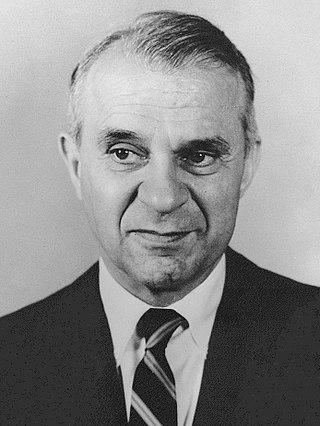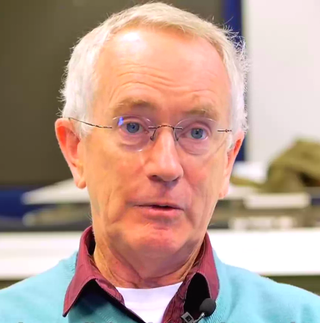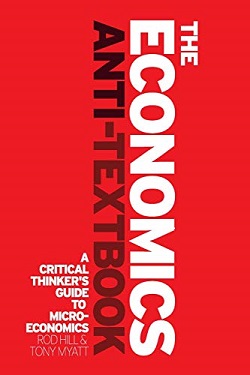Neoclassical economics is an approach to economics in which the production, consumption, and valuation (pricing) of goods and services are observed as driven by the supply and demand model. According to this line of thought, the value of a good or service is determined through a hypothetical maximization of utility by income-constrained individuals and of profits by firms facing production costs and employing available information and factors of production. This approach has often been justified by appealing to rational choice theory.
In the social sciences, methodological individualism is a framework that describes social phenomena as a consequence of subjective personal motivations by individual actors. Class or group dynamics which operate on systemic explanations, are deemed illusory, and, thus, rejected or de-prioritized, however, group dynamics for which there are individual subjective motivations are upheld. With its bottom-up micro-level approach, methodological individualism is often contrasted with methodological holism, a top-down macro-level approach, and methodological pluralism.

Wassily Wassilyevich Leontief, was a Soviet-American economist known for his research on input–output analysis and how changes in one economic sector may affect other sectors.

Steve Keen is an Australian economist and author. He considers himself a post-Keynesian, criticising neoclassical economics as inconsistent, unscientific, and empirically unsupported.
Institutional economics focuses on understanding the role of the evolutionary process and the role of institutions in shaping economic behavior. Its original focus lay in Thorstein Veblen's instinct-oriented dichotomy between technology on the one side and the "ceremonial" sphere of society on the other. Its name and core elements trace back to a 1919 American Economic Review article by Walton H. Hamilton. Institutional economics emphasizes a broader study of institutions and views markets as a result of the complex interaction of these various institutions. The earlier tradition continues today as a leading heterodox approach to economics.
Auxology is a meta-term covering the study of all aspects of human physical growth. Auxology is a multi-disciplinary science involving health sciences/medicine, and to a lesser extent: nutrition science, genetics, anthropology, anthropometry, ergonomics, history, economic history, economics, socio-economics, sociology, public health, and psychology, among others.
Philosophy and economics studies topics such as public economics, behavioural economics, rationality, justice, history of economic thought, rational choice, the appraisal of economic outcomes, institutions and processes, the status of highly idealized economic models, the ontology of economic phenomena and the possibilities of acquiring knowledge of them.
The Royal Economic Society (RES) is a professional association that promotes the study of economic science in academia, government service, banking, industry, and public affairs. Originally established in 1890 as the British Economic Association, it was incorporated by royal charter on 2 December 1902. The Society is a charity registered with the U.K. Charity Commission under charity number 231508.

Heterodox economics is any economic thought or theory that contrasts with orthodox schools of economic thought, or that may be beyond neoclassical economics. These include institutional, evolutionary, feminist, social, Post-Keynesian, ecological, Austrian, humanistic, complexity, Marxian, socialist, anarchist and modern monetary theory economics.
Mainstream economics is the body of knowledge, theories, and models of economics, as taught by universities worldwide, that are generally accepted by economists as a basis for discussion. Also known as orthodox economics, it can be contrasted to heterodox economics, which encompasses various schools or approaches that are only accepted by a minority of economists.

The European Association for Evolutionary Political Economy (EAEPE) is a pluralist forum of social scientists that brings together institutional and evolutionary economists broadly defined. EAEPE members are scholars working on realistic approaches to economic theory and economic policy. With a membership of about 500, EAEPE is now the foremost European association for heterodox economists and the second-largest association for economists in Europe.
The pluralism in economics movement is a campaign to change the teaching and research in economics towards more openness in its approaches, topics and standpoints it considers. The goal of the movement is to "reinvigorate the discipline ... [and bring] economics back into the service of society". Some have argued that economics had greater scientific pluralism in the past compared to the monist approach that is prevalent today. Pluralism encourages the inclusion of a wide variety of neoclassical and heterodox economic theories—including classical, Post-Keynesian, institutional, ecological, evolutionary, feminist, Marxist, and Austrian economics, stating that "each tradition of thought adds something unique and valuable to economic scholarship".

The Legatum Prosperity Index is an annual ranking developed by the Legatum Institute, an independent educational charity founded and part-funded by the private investment firm Legatum. The ranking is based on a variety of factors including wealth, economic growth, education, health, personal well-being, and quality of life.

The Abdul Latif Jameel Poverty Action Lab (J-PAL) is a global research center based at the Massachusetts Institute of Technology aimed to reducing poverty by ensuring that policy is informed by rigorous, scientific evidence. J-PAL funds, provides technical support to, and disseminates the results of randomized controlled trials evaluating the efficacy of social interventions in health, education, agriculture, and a range of other fields. As of 2020, the J-PAL network consisted of 500 researchers and 400 staff, and the organization's programs had impacted over 400 million people globally. The organization has regional offices in seven countries around the world, and is headquartered near the Massachusetts Institute of Technology in Cambridge, Massachusetts.

Klaus M. Leisinger is a social scientist and economist. He is founder and president of the Global Values Alliance in Basel. Until 2012 he was managing director and chairman of the Board of Trustees of the Novartis Foundation in Basel, Switzerland.
Michael John Ellman has been a professor of economics at the University of Amsterdam since 1978. He is now an emeritus professor. He has written on the economics of the Soviet Union, transition economics, Russia and comparative economic systems.

The Economics Anti-Textbook is both an introduction to, and critique of the typical approaches to economics teaching, written by Roderick Hill and Tony Myatt in 2010. The main thrust of the authors' argument is that basic economics courses, being centered on models of perfect competition, are biased towards the support of free market or laissez-faire ideologies, and neglect to mention conflicting evidence or give sufficient coverage of alternative descriptive models. This book has been updated and superseded by The Microeconomics Anti-Textbook and The Macroeconomics Anti-Textbook, by the same authors.
The Centre for Climate Change Economics and Policy (CCCEP) is a climate change research centre in England, which studies the economics of global warming. It is hosted jointly by the University of Leeds and the London School of Economics and Political Science (LSE).

Richard B. Norgaard is a professor emeritus of ecological economics in the Energy and Resources Group at the University of California, Berkeley, the first chair and a continuing member of the independent science board of CALFED, and a founding member and former president of the International Society for Ecological Economics. He received the Kenneth E. Boulding Memorial Award in 2006 for recognition of advancements in research combining social theory and the natural sciences. He is considered one of the founders of and a continuing leader in the field of ecological economics.
The International Student Initiative for Pluralist Economics (ISIPE) is an alliance of university student groups and societies from several countries campaigning for a reform of economics education and research. Founded in early 2014, the Initiative brings together various groups that had previously operated at a local or national level such as Rethinking Economics. It argues for a reorientation of the discipline toward pluralism in university curricula as well as research activity, involving the inclusion and equal treatment of heterodox approaches, greater interdisciplinarity, as well as increased awareness of methodological issues, the history of economic thought, and economic history.









